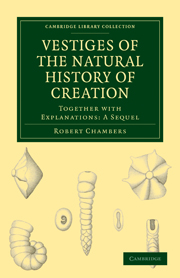Book contents
- Frontmatter
- Contents
- THE BODIES OF SPACE—THEIR ARRANGEMENTS AND FORMATION
- CONSTITUENT MATERIALS OF THE EARTH, AND OF THE OTHER BODIES OF SPACE
- THE EARTH FORMED—ERA OF THE PRIMARY ROCKS
- COMMENCEMENT OF ORGANIC LIFE—SEA PLANTS, CORALS, ETC
- ERA OF THE OLD RED SANDSTONE—FISHES ABUNDANT
- SECONDARY ROCKS—ERA OF THE CARBONIFEROUS FORMATION—COMMENCEMENT OF LAND PLANTS
- ERA OF THE NEW RED SANDSTONE—TERRESTRIAL ZOOLOGY COMMENCES WITH REPTILES—FIRST TRACES OF BIRDS
- ERA OF THE OOLITE—COMMENCEMENT OF MAMMALIA
- ERA OF THE CRETACEOUS FORMATION
- ERA OF THE TERTIARY FORMATION — MAMMALIA ABUNDANT
- ERA OF THE SUPERFICIAL FORMATIONS—COMMENCEMENT OF PRESENT SPECIES
- GENERAL CONSIDERATIONS RESPECTING THE ORIGIN OF THE ANIMATED TRIBES
- PARTICULAR CONSIDERATIONS RESPECTING THE ORIGIN OF THE ANIMATED TRIBES
- HYPOTHESIS OF THE DEVELOPMENT OF THE VEGETABLE AND ANIMAL KINGDOMS
- AFFINITIES AND GEOGRAPHICAL DISTRIBUTION OF ORGANISMS
- EARLY HISTORY OF MANKIND
- MENTAL CONSTITUTION OF ANIMALS
- PURPOSE AND GENERAL CONDITION OF THE ANIMATED CREATION
- NOTE CONCLUSORY
- APPENDIX
PARTICULAR CONSIDERATIONS RESPECTING THE ORIGIN OF THE ANIMATED TRIBES
Published online by Cambridge University Press: 05 August 2011
- Frontmatter
- Contents
- THE BODIES OF SPACE—THEIR ARRANGEMENTS AND FORMATION
- CONSTITUENT MATERIALS OF THE EARTH, AND OF THE OTHER BODIES OF SPACE
- THE EARTH FORMED—ERA OF THE PRIMARY ROCKS
- COMMENCEMENT OF ORGANIC LIFE—SEA PLANTS, CORALS, ETC
- ERA OF THE OLD RED SANDSTONE—FISHES ABUNDANT
- SECONDARY ROCKS—ERA OF THE CARBONIFEROUS FORMATION—COMMENCEMENT OF LAND PLANTS
- ERA OF THE NEW RED SANDSTONE—TERRESTRIAL ZOOLOGY COMMENCES WITH REPTILES—FIRST TRACES OF BIRDS
- ERA OF THE OOLITE—COMMENCEMENT OF MAMMALIA
- ERA OF THE CRETACEOUS FORMATION
- ERA OF THE TERTIARY FORMATION — MAMMALIA ABUNDANT
- ERA OF THE SUPERFICIAL FORMATIONS—COMMENCEMENT OF PRESENT SPECIES
- GENERAL CONSIDERATIONS RESPECTING THE ORIGIN OF THE ANIMATED TRIBES
- PARTICULAR CONSIDERATIONS RESPECTING THE ORIGIN OF THE ANIMATED TRIBES
- HYPOTHESIS OF THE DEVELOPMENT OF THE VEGETABLE AND ANIMAL KINGDOMS
- AFFINITIES AND GEOGRAPHICAL DISTRIBUTION OF ORGANISMS
- EARLY HISTORY OF MANKIND
- MENTAL CONSTITUTION OF ANIMALS
- PURPOSE AND GENERAL CONDITION OF THE ANIMATED CREATION
- NOTE CONCLUSORY
- APPENDIX
Summary
This concludes the general argument for organic creation by law, as preferable to that which, equally on hypothetic grounds, presumes a special exertion of divine power for each detached portion of that series of phenomena. We are now to inquire what organic nature herself says with respect to her origin; that is to say, whether she declares most loudly for the special or the general exercise of divine power in the production of her many tribes.
At the very first it may be frankly admitted, that there is no proof which has been satisfactory to the philosophical world, either of the origination of life from inorganic matter, or of the commencement of a new species, having ever once taken place since man first breathed on earth. It is not indeed strictly disproved that life is occasionally originated at the present time otherwise than by parentage; but neither has it been proved to the satisfaction of men of science that any such phenomenon ever did take place. There is here an appearance of strong presumption against the hypothesis of organic creation by law, and yet why should it be so considered? The great work of the peopling of this globe with living species is mainly a fact accomplished: the highest known species came as a crowning effect thousands of years ago. The work being thus, to all appearance, finished, we are not necessarily to expect that the origination of life and of species should be conspicuously exemplified in the present day.
- Type
- Chapter
- Information
- Vestiges of the Natural History of CreationTogether with Explanations: A Sequel, pp. 173 - 196Publisher: Cambridge University PressPrint publication year: 2009First published in: 1844

